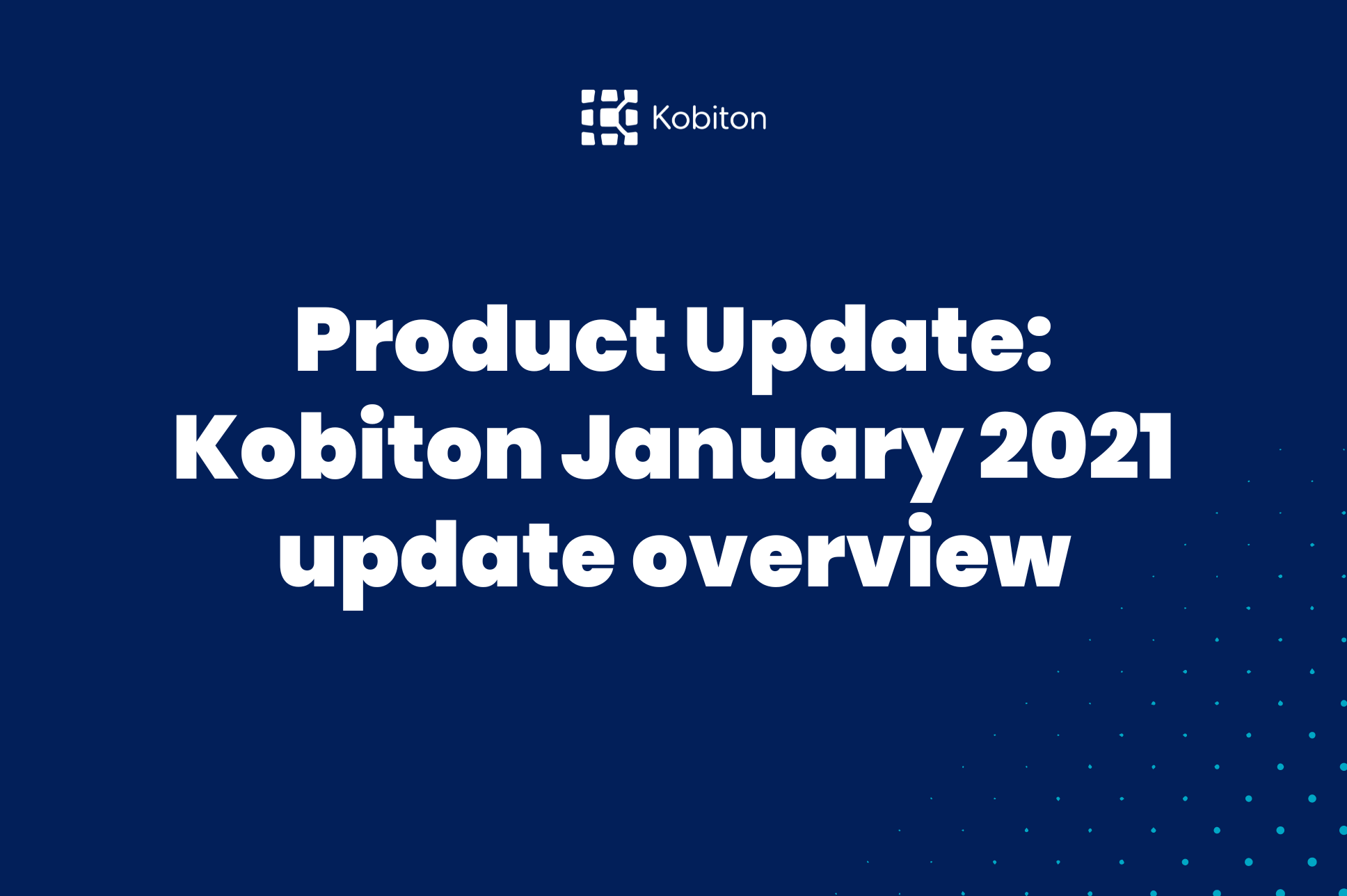
Product Update: Kobiton January 2021 update overview

Adam Creamer
Kobiton’s latest July 12th release comes jam-packed with some amazing features, and the folks here at Kobiton are excited to share these features with all of you! It is one of Kobiton’s core values to continue improving and delivering feature updates to bring our users not just the best, but the best of the best, and our latest release is sure telling of that! With this release, we have enhanced our recently introduced Role-Based Access Control to bring more granular control at the team level, along with enhancing also recently introduced Session Snapshots to be applied to all revisited sessions, all while ensuring your sensitive data is safe and secure while testing. And that’s just the start; the July release has so much more!
In Kobiton’s May 2021 release, we introduced Role-Based Access Control: a highly customizable, role-based system giving org. owners and admins a variety of permissions to be added to new and existing roles that can further be assigned to users. Users of an organization may be grouped into teams to help facilitate testing needs and provide an efficient workflow. With Kobiton’s July release, we are now offering even more granular control in organizations by providing two new org. management features at the team level: private testing mode and cleanup policy.
Private testing mode is an existing feature offered by Kobiton: when enabled during a manual session, all commands, videos, screenshots, videos, and logs will not be captured to ensure absolute control over sensitive data and testing. Once held at the org. level and individual level, private testing mode is now offered at the team level. Users with admin permissions in an organization may enable or disable private testing mode for a team. If enabled, all users of that team will experience private testing mode during manual sessions, and if disabled, users may still enable the feature on the individual level.
Cleanup policy is also an existing org. management feature once offered at the organization level, and now, also offered at the team level. Kobiton’s cleanup policy can be customized based on device type and what will be cleanup after a session: all apps installed will be removed, data will be cleared, browser history and data cleared, device settings will be reset, etc. Users with admin permissions now have the ability to create and set customized cleanup policies for a team as they see fit. Each user of that team will experience after-session cleanup based on the cleanup policy set.
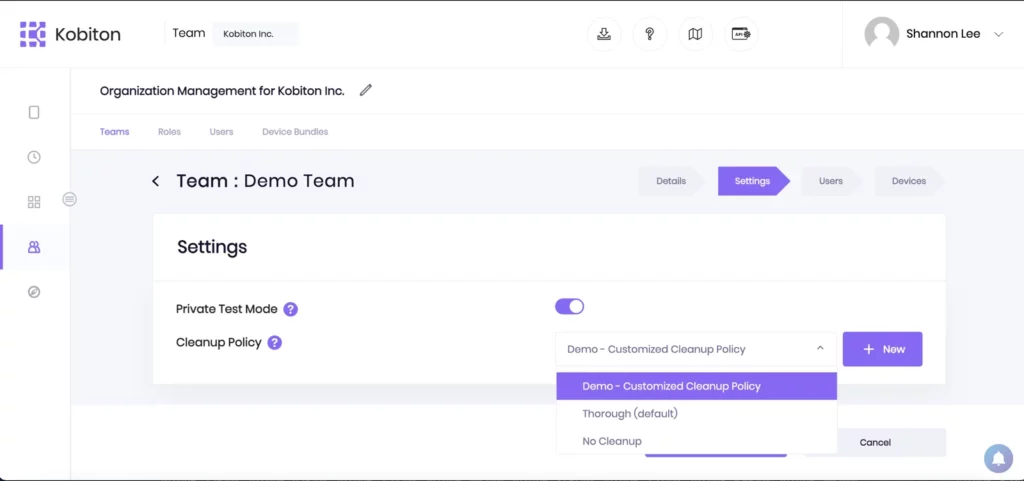
Bringing org. management features to the team level drastically gives admins and org. owners far more control on how they wish to organize their users than before. They have the ability to segment users and provide additional, more granular options to teams, rather than set features for the entire organization. With more organization of users comes a more efficient workflow that will enable teams to test faster and release sooner. And, Kobiton is set to deliver even more in future releases!
When it comes to testing, manual or automated, catching bugs sooner than later is always key. Kobiton strives to enhance features to help catch bugs faster and provide root-cause analysis, so that developers can address the issue straight on. Catching and fixing bugs quicker than before allows you to release on time or even sooner. That is why Kobiton feels Session Snapshots will be a great first line of defense in catching defects when testing.
Session Snapshots was also introduced in Kobiton’s May release. After a manual session, Session Snapshots will render a screenshot of each test step, along with highlighting elements on the page that were interacted with in purple. Kobiton wanted to provide added transparency into the test case creation and ensure that requirements per test case are met within a session. Now, in our latest July release, Session Snapshots will also render for each revisited session! After a manual session is created, a user may also execute the same session on whichever additional devices they select. Session Snapshots will render a screenshot per test step on additional device executions, and present each execution within the executions page. Not only will you be able to visually see each test step executed on various devices, but Session Snapshots is also a great, quick visual comparison of how each test step looks from device to device, right on the execution page. But wait, there’s more! If a test step was unable to execute, Session Snapshots will display an error message and present a blocker resolution option, so that a user may either resolve the blocker or create and log a defect ticket relating to the issue. No need to navigate to session details to see potential issues – Session Snapshots has it laid out for you, so you can catch bugs faster than before!
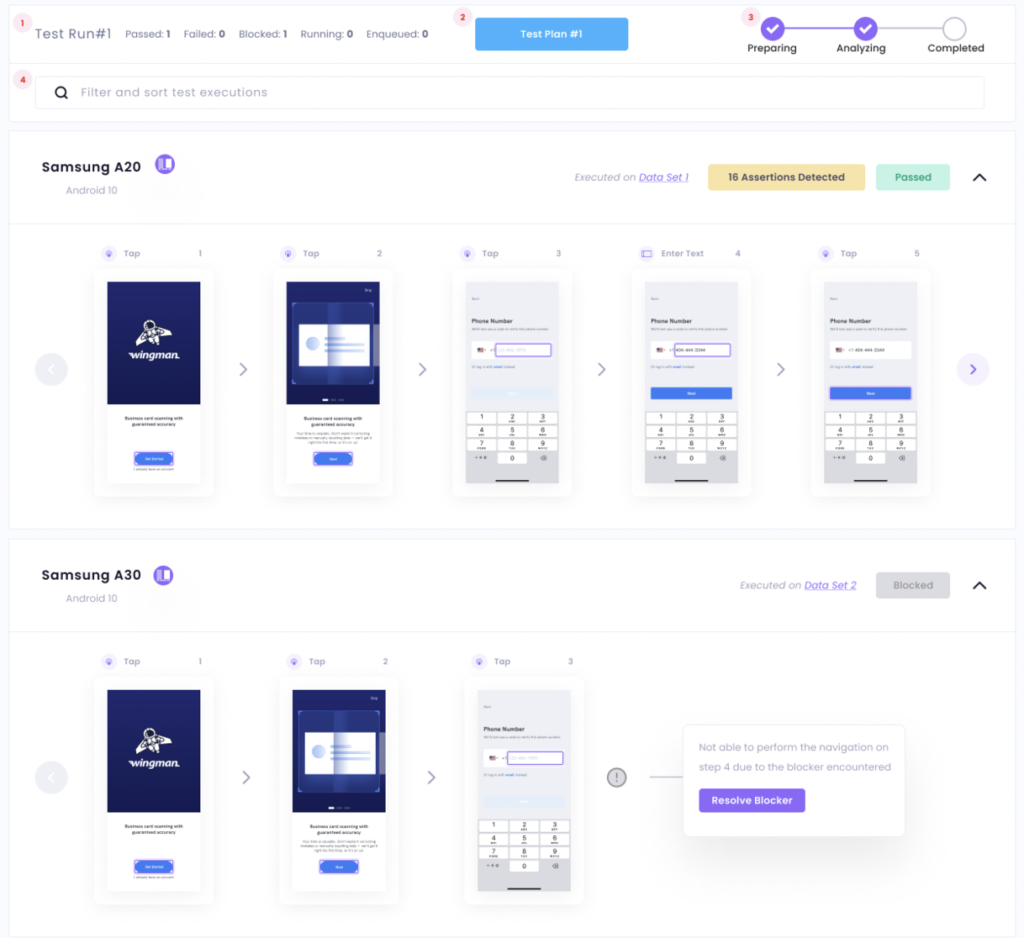
In every part of technology, security is essential to prevent sensitive data from leaking. That even goes for mobile application testing- testers are in need of testing all user scenarios, including test cases that involve sensitive data, like passwords. Kobiton has always taken security seriously and will continue to do so. With this latest release, Kobiton has delivered two new features to help users protect sensitive data while testing, and make sure sensitive data does not get leaked to others within the same team or organization.
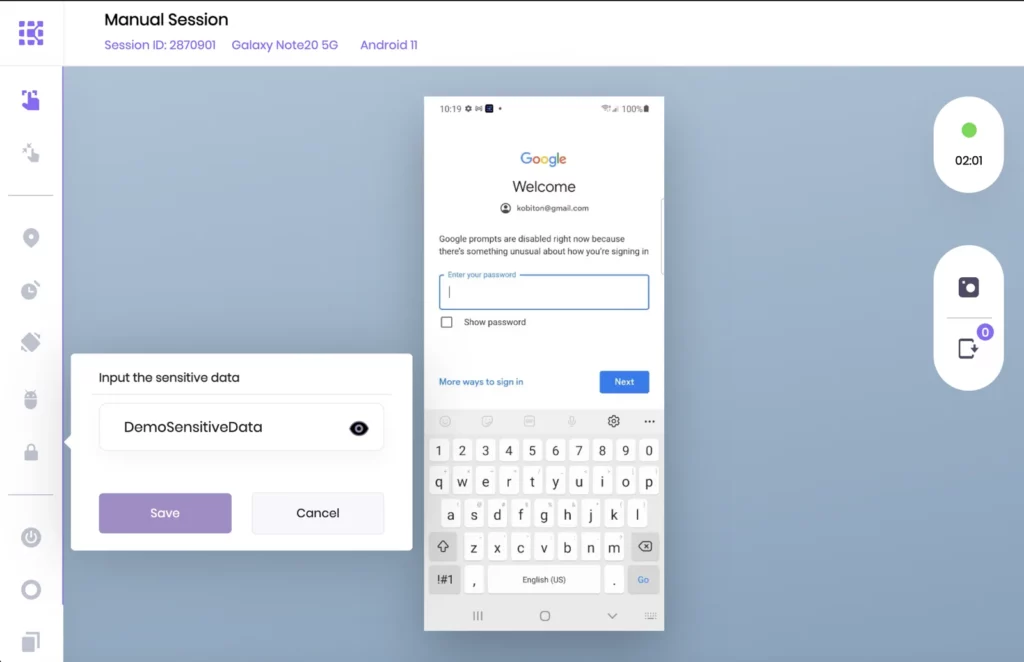
Now, during a manual session, there is an option for users to input full text to then be encrypted outside of the device screen. A user may input text they wish to hide, and after the manual session, that input will remain encrypted in the session details page. Taking even further measures to protect users’ sensitive data, Kobiton has also introduced the ability to mark set_text commands of data that are sensitive within a manual session. Thereafter, when running scriptless automation, sensitive data will remain hidden within the data-driven testing tab, as well as in the session details of revisit sessions. Protecting sensitive data is key, and with these added features, users may have the confidence that their sensitive data is protected with testing within Kobiton.
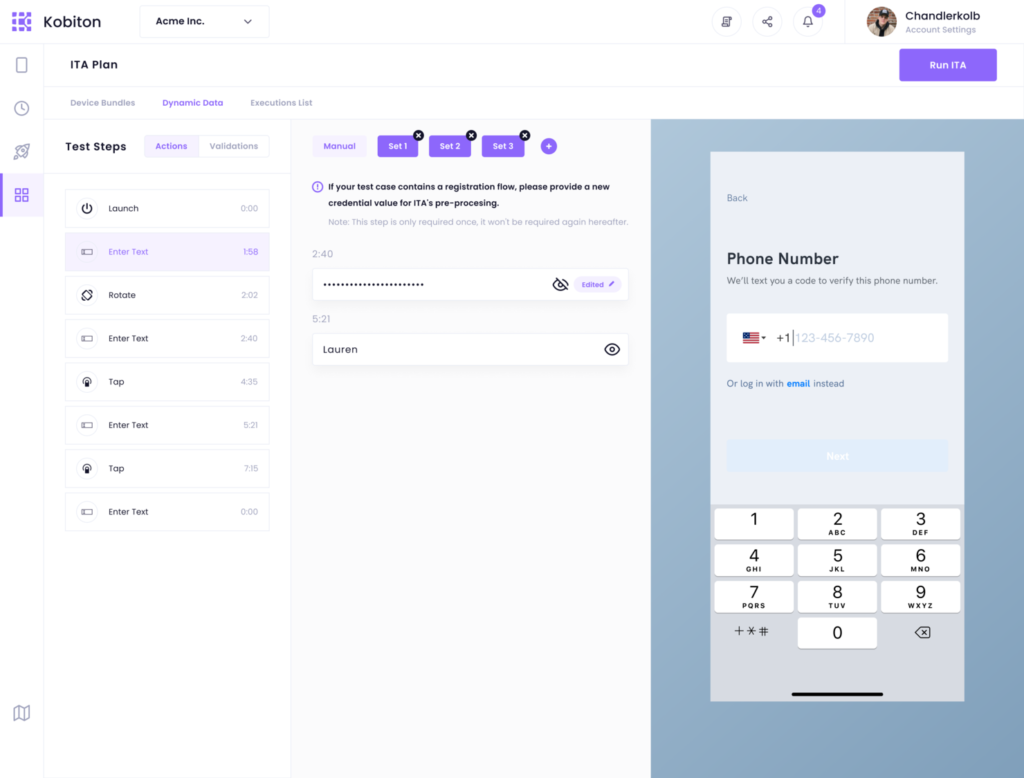
There was no exaggeration implied when I said this release comes jam-packed with updates and features! Along with staying up-to-date with the latest versions of operating systems, users now have the ability to bypass one-time passwords from SMS or email, enjoy text assertions in Appium exports, filter devices, and make an API call to see softbooking history. Read on for more information on these compelling updates and features!
For testing, one-time passwords can be a pain, especially in automation. That is why Kobiton now has the ability to bypass one-time passwords, from SMS and/or email, when running scriptless automation and script-based automation. For SMS one-time passwords, Kobiton already handles this issue in scriptless automation, but can now do so for exported Appium scripts. Additionally, the same has now been delivered for emailed one-time passwords, so that Kobiton users don’t remain blocked in automation efforts when one-time passwords are present within a test case.
Kobiton offers text assertions within our scriptless solution, and we are ecstatic to now offer a new, desired capability of text assertions for our script-based solution! After running a manual session that involves text assertions, a user may export the session to an Appium script that will include the text assertions. Once exported, a user now has the ability to run additional executions with the same script that now includes the capability of executing text assertions!
Another core value of Kobiton is to make things easier, even in the smallest ways, and that includes quickly sorting and filtering devices, public or private, on the device list page, so that users can easily find a device they are in need of for their testing efforts. Devices may be filtered by device type- Android or Apple- and further sorted by OS version, device name, or friendly name. With 350+ devices offered in Kobiton’s public cloud, find exactly the device you need instantly!
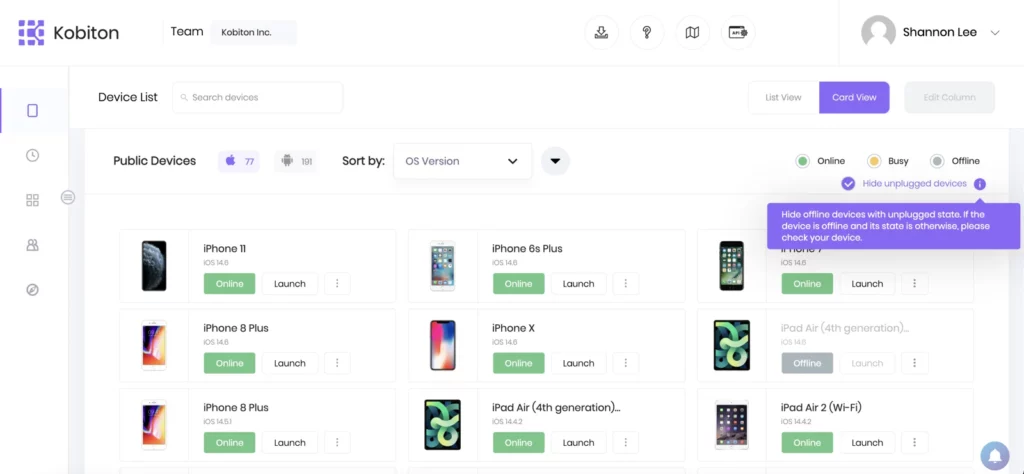
Kobiton’s softbooking feature of private devices helps users reserve a needed device to help accomplish testing needs in a timely manner. Now, users may call an API endpoint that will return all the softbook reservation history of private devices within a set period, so that additional transparency is given within teams and organizations on who reserved which device and when.
Kobiton now supports iOS 14.7 beta with Xcode 12.5; iOS 15 beta with Xcode 13 beta; and Android 12 beta.
Kobiton strives to bring the best of the best to our users with each new release and will continue to do so in future releases. We want to take existing features and make them even better than before to deliver an easy-use, yet robust and resilient, automation tool. With Kobiton’s latest release, organizations gain even more control of organizing teams, execute fast, reliable, and easy automation – all while keeping sensitive data safe-, and can easily view test case executions all while finding defects faster! And as always, there will always be more to come from Kobiton!